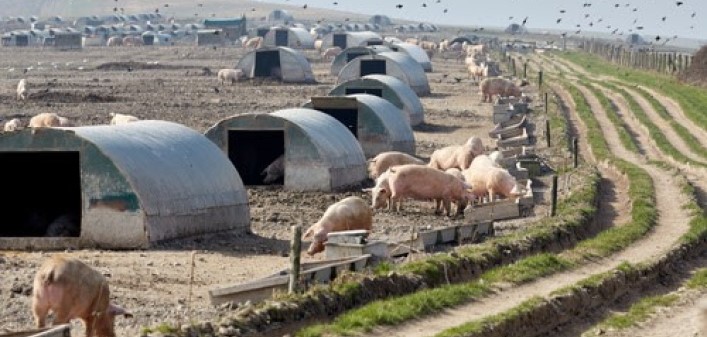A farmer is to be paid public money to stop keeping pigs on his land in Norfolk, in order to facilitate a major housing development in what is reportedly the first deal of its type.
The Eastern Daily Press reports that the ‘highly unusual deal’ is part of a move to reduce the amount of nutrients flowing into Norfolk’s waterways, as part of the Government’s nutrient neutrality requirements, to get housebuilding moving again.
The aim of removing pigs from the site, located on either side of the A47 bypass south of Norwich, is to prevent ‘harmful nutrients’ from the pigs running into two nearby rivers, the Yare and Tas. This would enable the council to grant permission for 5,000 homes elsewhere in the county, the EDP reports.
Under the terms of the deal, the farmer will be compensated by an unspecified amount, and covenants placed on his land, meaning pigs can no longer be farmed there. The farmer would still be allowed to grow arable crops, hay or to cover the land with grass seed or wild flowers.
The report explains that since March last year, local authorities have been unable to give housing the go-ahead in catchment areas of the river Wensum and the Broads. This follows a directive Natural England, specifying that councils could not agree new housing unless developers could ‘offset’ the extra nutrients which would flow from wastewater in the new homes, for example from washing machines and sewage.
Since then, councils have been trying to find ways to provide mitigation measures – and the deal over the pig farm is said to be the first example.
The unnamed farmer will be compensated by Norfolk Environmental Credits Ltd, a joint venture between Norfolk councils and Anglian Water. Councils are reportedly borrowing millions to lend to that company, so it can come up with mitigation schemes and allow decisions on homes to be made once again.
Developers would be able to buy ‘credits’ from Norfolk Environmental Credits to offset nutrients created by their housing schemes.
Phil Courtier, director of place at Broadland and South Norfolk councils, said: “We are on the cusp of finalising a deal that will be the first of its kind in the country to release a significant number of homes and improve the environmental quality of the Broads and the river Wensum.”
Council leaders are reportedly hoping more farmers will come forward to help provide mitigation measures.
However, the story has inevitably raised concerns within the pig sector, including the principle of closures being used to offset potential pollution from housing development, and the potential for pig production capacity to be lost.
There are wider concerns, too. Independent South Norfolk councillor Clayton Hudson said: “My concern is about openness and transparency, with this potential use of public money.
“And I’m not sure stopping a pig farmer from putting nutrients in the system only to replace that with more development solves the issue.”
The matter was due to be discussed at a meeting of South Norfolk Council’s planning committee today, October 25.
The EDP reported that the government had tried to scrap the nutrient neutrality requirements, with prime minister Rishi Sunak and local government secretary Michael Gove announcing their intent during a visit to Hethersett in the summer.
However, the government’s bid was defeated in the House of Lords, with Labour and Liberal Democrat peers joined by three Tory peers in voting to block ministers’ plans to rip up the rules.
Nutrient neutrality
Jonathan Pyle, PR manager for South Norfolk Council, said: “Nutrient neutrality has had a profound impact on many parts of the country and has stalled thousands of desperately needed homes.
“One of the most significantly affected areas is Norfolk where multiple Districts have been unable to grant planning permission for new homes for the last 18 months leading to a backlog of approximately 16,000 new homes.
“While it is acknowledged that the Government is continuing to seek a ‘silver bullet’ solution to the restrictions arising from nutrient neutrality in this vacuum of uncertainty there is a need to deliver local solutions to re-start our growth agenda.
“In response, a number of Districts in Norfolk have formed a unique partnership to address this potentially catastrophic impediment to growth. Four Councils – South Norfolk, Broadland, Breckland and North Norfolk – have established a new Joint venture company called, Norfolk Environmental Credits (NEC). The company will provide a trading platform for nutrient offsetting and other environmental credits, including Biodiversity Net Gain (BNG).
“Norfolk Environmental Credits is designed to secure largescale nutrient mitigation from projects such as changes in use of agricultural land, septic tank conversion and water infrastructure enhancements, etc. These credits are then parcelled up by the company and sold to developers to offset the equivalent amount of nutrients arising from their new development.”




